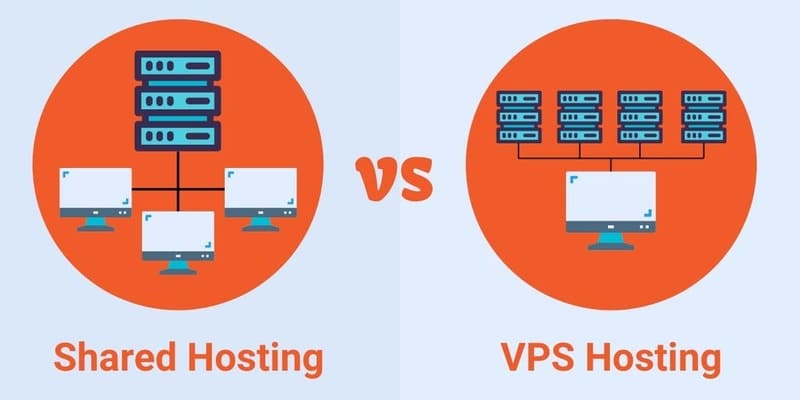Shared Hosting vs VPS Hosting: What Are The Differences?

When you’re ready to launch a website, one of the first decisions you’ll face in web hosting services is choosing the right hosting plan. Two popular options are Virtual Private Server (VPS) hosting and shared hosting. Understanding the difference between VPS and shared hosting can help you make the best choice for your website needs.
What is Shared Hosting?
In shared hosting, multiple websites coexist on one server, sharing resources like storage and processing power. Like you would share common rooms in an apartment building, this option is often the most affordable because the costs are split among many users.
What is VPS Hosting?
VPS hosting is more like owning an Apartment. You still share a physical server with others, but you have your own dedicated portion of it. This gives you more control and resources compared to shared hosting.
Shared Hosting vs VPS Hosting: Key Differences
| Feature | Shared Hosting | VPS Hosting |
| Cost | Lower | Higher |
| Performance | Limited | Better |
| Security | Basic | Enhanced |
| Customisation | Limited | Extensive |
| Scalability | Limited | Easily scalable |
| Resource Allocation | Shared with other users | Dedicated resources |
| Technical Expertise Required | Minimal | Moderate to high |
| Server Control | Limited | Full root access |
| Ideal For | Small websites, beginners | Growing websites, businesses |
| Uptime | Good | Excellent |
Let’s explore the key differences in depth:
● Performance
In the shared vs VPS hosting debate, performance is a crucial factor. Shared hosting can be slower because you’re competing for resources with other websites. VPS hosting, on the other hand, gives you dedicated resources, which usually results in faster loading times and better overall performance.
● Security
When considering the difference between VPS and shared hosting, security is another important aspect.
Shared hosting environments are generally more vulnerable to security breaches because of the large number of websites on one server. VPS hosting provides better isolation, making it harder for security issues to spread from one site to another.
● Customisation
With shared hosting, you’re limited in what you can change on the server. VPS hosting provides you full root access, which allows you to install any software and make changes to your server environment.
● Scalability
Your website may require additional resources as it expands. Scaling up is usually easier with VPS hosting because you can add more resources without changing your entire hosting setup. With shared hosting, you might need to switch to a different plan or hosting type altogether.
● Cost
When deciding between VPS or shared hosting, cost is often a deciding factor. Shared hosting is typically much cheaper, making it a good choice for small websites or those just starting out. VPS hosting costs more but offers better value for growing websites that need more resources and control.
Shared Vs VPS Hosting – Which One Should You Choose?
Choose Shared Hosting If:
- You’re just starting out with a new website
- You have a small website with low-traffic
- You’re on a tight budget
- You don’t need advanced customisation options
Choose VPS Hosting If:
- Your website is growing
- You require better performance and reliability
- You want more control over your server environment
- You have some technical knowledge
As your website expands, you can begin with shared hosting in India and then move towards VPS hosting. Many hosting providers offer easy upgrade paths, allowing you to scale your hosting as your needs change.
Conclusion
Both shared hosting and VPS hosting have their place in the web hosting world. By understanding the differences between Shared and VPS hosting, you can make a perfect decision that best suits your website’s current needs and future growth.